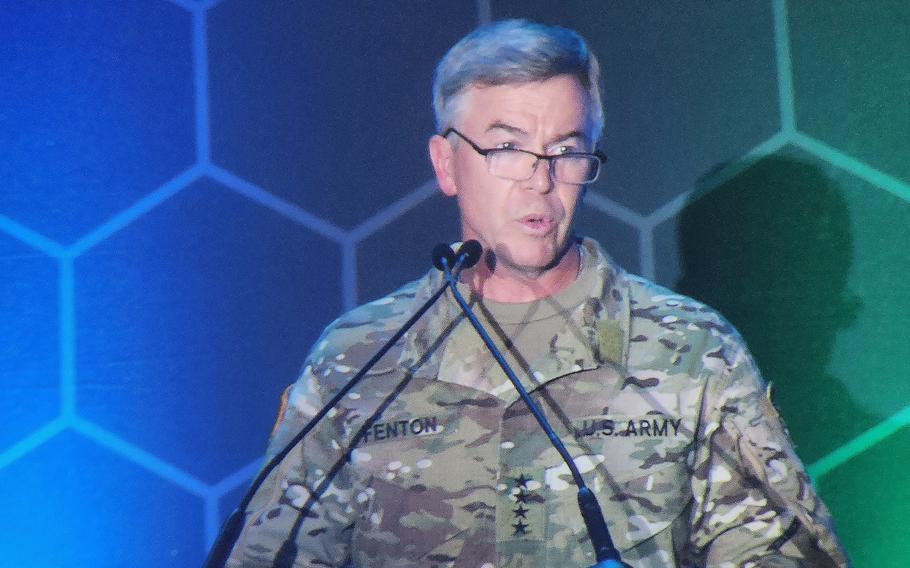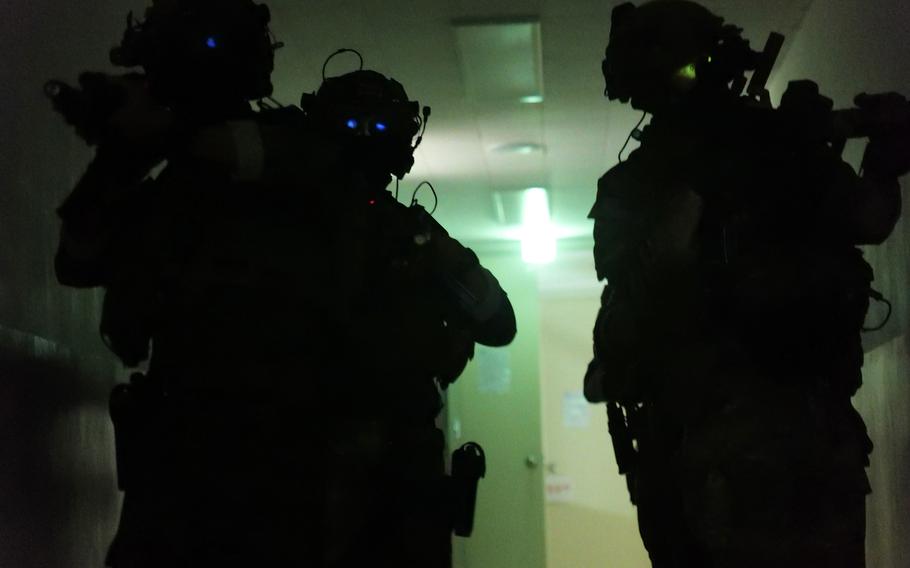
U.S. Army Gen. Bryan Fenton, head of U.S. Special Operations Command, speaks Aug. 14, 2024, to an international audience attending the three-day Indo-Pacific Irregular Warfare Symposium in Honolulu. (Wyatt Olson/Stars and Stripes)
WAIKIKI BEACH, Hawaii — The decade ahead will require an international coterie of special operations forces to counteract malign advances by the likes of Russia and China, the commander of U.S. Special Operations Command said Wednesday.
“This is an era of converging waves, global challenges, so to speak, that require an international SOF convergence,” Gen. Bryan Fenton said during a keynote address at the three-day Indo-Pacific Irregular Warfare Symposium at Waikiki Beach.
The symposium is hosted by the Global Special Operations Forces Foundation, a nonprofit professional organization based in Tampa, Fla., dedicated to advancing the capabilities and efficacy of special forces.
Irregular warfare defies easy definition, but generally describes conflict carried out in domains such as economics, cyber and information rather than conventional, kinetic warfare.
“Irregular warfare is a critical tool for the Department of Defense to campaign across the spectrum of conflict, enhance interoperability and access, and disrupt competitor warfighting advantages while reinforcing our own,” Defense Secretary Lloyd Austin wrote in an August 2023 memo announcing updated guidance for irregular warfare.
Interoperability is the military term for one country’s ability to use the training methods and equipment of another country.

U.S. and South Korean special operations troops team up for realistic training in Jinhae, South Korea, Aug. 23, 2023. (Steven Patzer/U.S. Navy)
U.S. Special Operations Command directs the special operator component commands of the Army, Marine Corps, Navy and Air Force.
“This week’s gathering here of special operations teammates and academia and industry and businesses from all over the globe is an international SOF convergence, and that makes this a conference of consequence,” Fenton told the audience, which included representatives from special operations units from more than two dozen nations.
Fenton oversees 70,000 special operations personnel and an annual budget of $14 billion.
He is a former deputy commander of U.S. Indo-Pacific Command and deputy commanding general of the 25th Infantry Division in Hawaii.
Christopher Maier, assistant secretary of defense for special operations and low-intensity conflict, highlighted the tasks ahead for special operations during a speech Wednesday.
“The threats and challenges in the Indo-Pacific are transnational and coming at us through all domains — and it feels like with unprecedented velocity,” said Maier, who formerly headed the DOD’s Defeat-ISIS Task Force.
“From the perspective of the national defense strategy, which continues to be our North Star in the Department of Defense, it’s Russia’s malign activities that pose an acute threat to regional and global stability, while North Korea continues to attempt to destabilize this region and the People’s Republic of China remains our long-term pacing challenge of those competitors,” he said.
But only China possesses the intent — and increasingly the economic, diplomatic, technological and military capability — to reshape the current rules-based international system, Maier said.
China’s “semi-permissive legal environment” allows it to piggyback on criminal activities to extend its influence throughout the region, he said.
“Here we see Chinese money-laundering organizations use many complex techniques, including trade-based schemes, informal value transfer systems such as cryptocurrency exchanges and underground banking systems to extend their reach,” Maier said.
“China sees the rising global reach and influence of criminal groups as another tool with which it can advance its Belt and Road Initiative and its new Global Security Initiative, which aims directly at countering global security norms.”
Fenton said that “international SOF convergence” to counter such gray zone activities means “creating new partnerships, uniting existing partners into a more resilient, powerful and capable network, woven together in this region by a shared vision of a free and open Indo-Pacific.”